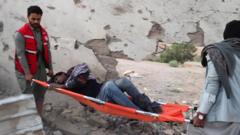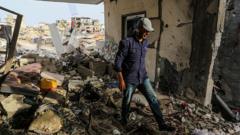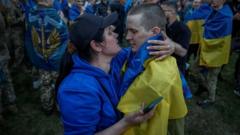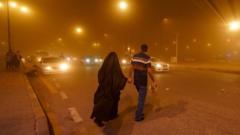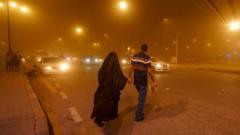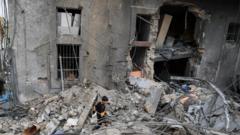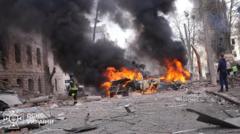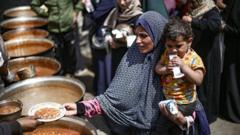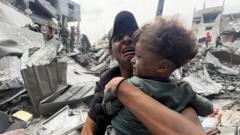As Turkey intensifies its military operations against the Kurdish PKK group, Iraqi villages like Sergele are caught in the crossfire, leading to fears of displacement and loss of livelihood.
### Tensions Rise in Iraq's Kurdish Region Amid Turkish Military Expansion
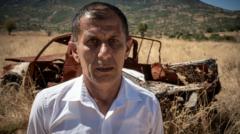
### Tensions Rise in Iraq's Kurdish Region Amid Turkish Military Expansion
The ongoing conflict in Iraqi Kurdistan has created a dire situation for local villagers facing the encroachment of Turkish military bases.
The picturesque village of Sergele situated in Iraq’s northern Kurdish region, has become emblematic of the tension between the Turkish state and Kurdish militants, particularly the PKK. Known for its lush pomegranate and almond orchards, Sergele is now shadowed by Turkish military installations that have proliferated in recent years. The village's farmer, Sherwan Sergeli, argues that these military outposts constitute an illegal occupation of Kurdish territory, with access to agricultural land drastically reduced as operations escalate.
The area surrounding Sergele is classified as the "Forbidden Zone," defined by ongoing conflict and military activities related to Turkey’s long-standing battle with the PKK, which began in the 1980s. Observers note that recent Turkish expansions within this zone, which have included the construction of numerous bases—totaling over 136 installations since December 2024—are indicative of a broader strategy aimed at maintaining control over more than 2,000 square kilometers of land.
Despite its claims of targeting militants, numerous reports suggest that the Turkish military has inadvertently or purposefully harmed civilians, contributing to casualties and mass displacement. Civilian groups in Iraqi Kurdistan estimate that drone strikes and airstrikes in these areas have left hundreds of lives shattered. Salam Saeed, another farmer affected by the situation, indicates that cultivating his vineyard has been impossible due to the proximity of military operations, describing some of the oppressive realities for locals struggling to maintain their livelihoods.
Political dynamics further complicate the situation, as Iraq’s government publicly condemns Turkey's military presence yet privately accommodates its actions. Economically dependent on Turkey for trade and investment, the Iraqi leadership finds it difficult to counter Turkey's influence in the region. Moreover, local Kurdish authorities have shown a tendency to downplay the ramifications of Turkish military actions, with the ruling Kurdistan Democratic Party (KDP) blaming the PKK for the security presence instead of addressing civilian impacts directly.
As tensions continue to rise, the conflict has taken a heavy toll on civilians. Tragic stories, such as that of 24-year-old Alan Ismail, who was killed by an airstrike, illustrate the human cost of these military operations, prompting calls for accountability that often go unmet. The Kurdish authorities’ reluctance to acknowledge such losses has left many families grappling with grief and seeking justice in a context fraught with political entanglements.
The overarching sentiment among locals remains one of anxiety and helplessness, faced with an unwanted militarized presence on their land, and lingering doubts about their future, as the cycle of conflict shows no signs of abating.
The area surrounding Sergele is classified as the "Forbidden Zone," defined by ongoing conflict and military activities related to Turkey’s long-standing battle with the PKK, which began in the 1980s. Observers note that recent Turkish expansions within this zone, which have included the construction of numerous bases—totaling over 136 installations since December 2024—are indicative of a broader strategy aimed at maintaining control over more than 2,000 square kilometers of land.
Despite its claims of targeting militants, numerous reports suggest that the Turkish military has inadvertently or purposefully harmed civilians, contributing to casualties and mass displacement. Civilian groups in Iraqi Kurdistan estimate that drone strikes and airstrikes in these areas have left hundreds of lives shattered. Salam Saeed, another farmer affected by the situation, indicates that cultivating his vineyard has been impossible due to the proximity of military operations, describing some of the oppressive realities for locals struggling to maintain their livelihoods.
Political dynamics further complicate the situation, as Iraq’s government publicly condemns Turkey's military presence yet privately accommodates its actions. Economically dependent on Turkey for trade and investment, the Iraqi leadership finds it difficult to counter Turkey's influence in the region. Moreover, local Kurdish authorities have shown a tendency to downplay the ramifications of Turkish military actions, with the ruling Kurdistan Democratic Party (KDP) blaming the PKK for the security presence instead of addressing civilian impacts directly.
As tensions continue to rise, the conflict has taken a heavy toll on civilians. Tragic stories, such as that of 24-year-old Alan Ismail, who was killed by an airstrike, illustrate the human cost of these military operations, prompting calls for accountability that often go unmet. The Kurdish authorities’ reluctance to acknowledge such losses has left many families grappling with grief and seeking justice in a context fraught with political entanglements.
The overarching sentiment among locals remains one of anxiety and helplessness, faced with an unwanted militarized presence on their land, and lingering doubts about their future, as the cycle of conflict shows no signs of abating.


